|
RESEARCH
In the early 1990s, I had just founded a new publishing company, finished writing a book on Jesuits, and started to work on a new Book, Baby before Birth, with echographists (Dr. Kutner wrote the text), when I decided to write a book on my two grandmothers – one having seen the twilight of the Ottoman Empire, the other having been exiled from the dying Austrian-Hungarian Empire by the tyrant Bela Kun. A cousin of mine gave me a portfolio with some photos and scribbled pages with an almost illegible text, written by the “little pasha of Jerusalem” as they used to call him in the newspapers, and three amazing letters which told about wars, plots, and a debt in gold owed by the Rothschild family to my grandfather. There started a ten year adventure on the trail of my ancestors but also of the roots of the modern world and the actual conflicts in Europe, in the Middle-East and in the world. The ‘coincidences’ have been innumerable : I met people who helped me a lot ; a shell had demolished a wall on Jaffa road, behind which the Archivist Georges Weill and Professor Simon Schwarzfuchs, a famous historian, found other letters by my grandfather ; a real estate agent had discovered that my family still possessed land in Israel ; I met an old man who, as a child, had been saved from being hung by “the little pasha” …
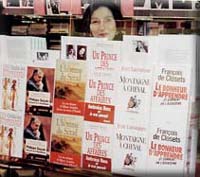 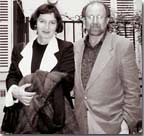 Tony Crawford, the Australian publisher who has the English translation and is looking for an American or English publisher as co-partner : Tony Crawford, the Australian publisher who has the English translation and is looking for an American or English publisher as co-partner :
SUMMARY
The life and times of Albert Antebi (1873-1919), precursor of the future state of Israel, related by his grand daughter. An Ottoman citizen, born in Syria, A. Antébi emerges as a pragmatic, multicultured Jewish secularist, partner of the most influent Arab families (like the Husseinis or Nashashibis, adviser of the diplomats, kingpin for the Rothschild settlements, right-hand of the tyrant Djemal Pasha for his engineering projects, soldier of Mustapha Kemal, political opponent to the future First Minister David Ben Gurion – who owed his liberty, if not his life, to Antebi’s intervention in 1915. Ben Gurion described him as “the most notable personage in Jerusalem. The fiery and passionate human being, who struggled all his life to obtain that people around will live better, this Lawrence of Arabia of the other side of the mirror, was, before all, a free spirit, religious but pragmatic. From 1919 on, he wrote approximately the project, which is today discussed and wanted for the tomorrow peace in that part of the world. The book reflects the great complexity of the Middle East at the turn of the century and is divided into four main parts : The Epoch of the Barons, The Pawns of the Great Powers, Sultan ‘Red Fox’ at Bay, Pashas without a God.
PRESS BOOK
Dear Elizabeth,
I just finished reading L'homme du Serail (“The Jewish Little Pasha of Jerusalem”) Wow! It was fantastic. Your research, the level of detail, the incredible insights into a lost world and an important historical moment--it was all wonderful and thrilling. I enjoyed it tremendously and want first of all to congratulate you on your achievement.[…]I am sure that your work will continue to serve as a reference for many, many scholars, journalists, and researchers for years to come! Thank you for sharing it with me.
Yours,
Amy Dockser Marcus, Journalist at the Wall Street Journal, and Author of The View from Nebo, Little, Brown and Cy, 2000.
“This excellent book sheds a new and precious light on the general evolution of the Jews in Europe and the Orient, on the Ottoman Empire, with amazing chapters on the Young Turk revolution and the rising sun of Mustapha Kemal, and on the chess game of the great Powers between the Congress of Berlin of 1878 and the end of World War I. From now on, nobody can write the history of this period without referring to this work.” Jacques Le Goff, Honorary Director, Ecole des hautes Etudes en Sciences Sociales, Paris. Author of many famous historical works, including the recent French best-seller Saint-Louis.
« E. Antébi has written a dramatic saga of blood, sweat and tears that is every bit as pertinent, in the annals of the modern state of Israel, as bestsellers such as Exodus and O Jerusalem !” William Skyvington, Choranche, March 1995.
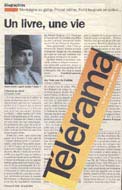 « I never want to join any group, secret or not … My principles are those of the whole of humanity, and I don’t fell any need to select just some of them … Being the brother of everybody, I refuse to adopt favourite brothers. Albert Antébi (1873-1919) made this universalist declaration of his principles at the occasion of the entrance of one of his friends in a Free-mason lodge. The multiplicity of the visiting cards of this ‘Jewish Little Pasha of Jerusalem’ illustrates his permanent refusal to give himself any particular label. « I never want to join any group, secret or not … My principles are those of the whole of humanity, and I don’t fell any need to select just some of them … Being the brother of everybody, I refuse to adopt favourite brothers. Albert Antébi (1873-1919) made this universalist declaration of his principles at the occasion of the entrance of one of his friends in a Free-mason lodge. The multiplicity of the visiting cards of this ‘Jewish Little Pasha of Jerusalem’ illustrates his permanent refusal to give himself any particular label.
He was certainly a Jew, but as much a Syrian (born in Damascus). He was a subject of the Ottoman Empire (dead at Constantinople); but also ‘wanted’ as a friend of France (where he carried out his studies at the time of the Dreyfus Affair). He was the proxy manager for Edmond de Rothschild, for whom he negotiated and protected the Jewish settlements in Palestine. But at the same time he was the friend, or close relation, of the most prominent Arab families of the Middle East. Director of the Institute of Technology of the Alliance israélite universelle at Jerusalem, Albert Antébi was received on a daily basis by the Turkish pashas and viziers, and advised the Western consuls. Although a political opponent of Ben Gurion, Antebi did not hesitate to save his life when he was arrested by Jemal Pasha in 1915. Despite being haunted by the God of Israel, he was not infatuated by Judaic ritual; indeed, he confided delightfully in Father Lagrange, Dominican priest and founder of the Biblical School of Jerusalem.
So who was Antébi ? Double or triple agent ? No. Just a born go-between. Emotive, man of action, sensible to thousands of daily stimuli, devoured by time and space, eager to change everything as soon as possible (if not sooner), convinced that he was able to bring the worst enemies in the world together to talk, Albert Antébi never stopped talking, writing (thousands of letters), to advise, to convince, to threaten, to fight. He was all at once teacher, lawyer, soldier, businessman and detective. At the crossroads of danger and hope, the saga he created with blood and neurones at the turn of the century, elevate this man of the Seraglio, this Jewish Pasha, to the status of a monument to the Mediterranean Orient – as explosive, ambiguous and divorced from normality as a world being constantly reinvented.
Telling, with incredible and intelligent mastery, the previously untold history of her grandfather, Elizabeth Antébi gives an incomparable demonstration of the art of being a granddaughter. She does not fail to justify the reputation of her glorious ancestor. » Yves-Noël Lelouvier, Télérama, 14 août 1996.
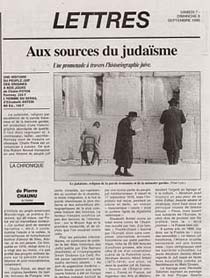 « […]Elizabeth Antébi lifts the lid a far less well-known chapter, on the day-before-yesterday concealed by yesterday, of a far Near-East fascinated by a Europe, which was, at that time, uninhibited. Journalist, writer, historian, rich for having read 50 000 letters from private archives, she offers us the life of a forgotten but important constructor of Jewish Palestine, Albert-Abraham Antébi (1873-1919), who was born in the Jewish quarter of Damascus, ‘jewel in the crown of the Ottoman Empire’. Trained in France, this engineer of the French ‘Arts et Métiers’ - Institute of Arts and Technology – director of the Vocational School of the AIU in Jerusalem, became a skilful negotiator for the Rothschild settlements, and the right-hand man of the baron himself. Antébi had a genius for public relations and was by nature close to his Arab neighbours. You will live the throes of this colonization of Palestine, not by a powerful army, but by the triumph of the spirit; you will be breathless, desperate to know what happens next, as in any wonderful thriller. You will ask yourself : Was he really a prophet ? Or just a tough man, a courageous translator and go-between in a very difficult situation, an expert in hostiles cultures, with which, as opposite to him as they were, he felt himself in harmony.[…] Religious, but open to the lights of Europe, the father dreams of sending his favourite son to the ‘Promised Land’ – France of course..[…] What a proof for the young French wife, Henriette – at the table of her in-laws in Cairo, women standing behind the men, who were seated, and served them. And then : eight children, the ‘romantic escapades’ with servants of the loving but fickle husband … And thank you, Elizabeth Antébi, for establishing that the former empires, Austro-Hungarian and Turkish, were much more tolerants than the nationalism that has replaced them.. » Pierre Chaunu, Member of the Académie Française, Le Figaro, September 7-8, 1996. « […]Elizabeth Antébi lifts the lid a far less well-known chapter, on the day-before-yesterday concealed by yesterday, of a far Near-East fascinated by a Europe, which was, at that time, uninhibited. Journalist, writer, historian, rich for having read 50 000 letters from private archives, she offers us the life of a forgotten but important constructor of Jewish Palestine, Albert-Abraham Antébi (1873-1919), who was born in the Jewish quarter of Damascus, ‘jewel in the crown of the Ottoman Empire’. Trained in France, this engineer of the French ‘Arts et Métiers’ - Institute of Arts and Technology – director of the Vocational School of the AIU in Jerusalem, became a skilful negotiator for the Rothschild settlements, and the right-hand man of the baron himself. Antébi had a genius for public relations and was by nature close to his Arab neighbours. You will live the throes of this colonization of Palestine, not by a powerful army, but by the triumph of the spirit; you will be breathless, desperate to know what happens next, as in any wonderful thriller. You will ask yourself : Was he really a prophet ? Or just a tough man, a courageous translator and go-between in a very difficult situation, an expert in hostiles cultures, with which, as opposite to him as they were, he felt himself in harmony.[…] Religious, but open to the lights of Europe, the father dreams of sending his favourite son to the ‘Promised Land’ – France of course..[…] What a proof for the young French wife, Henriette – at the table of her in-laws in Cairo, women standing behind the men, who were seated, and served them. And then : eight children, the ‘romantic escapades’ with servants of the loving but fickle husband … And thank you, Elizabeth Antébi, for establishing that the former empires, Austro-Hungarian and Turkish, were much more tolerants than the nationalism that has replaced them.. » Pierre Chaunu, Member of the Académie Française, Le Figaro, September 7-8, 1996.
« Born in Damascus, Syria, in 1873, Albert Antebi had but one goal: France. This beloved France realised his dream and welcomed him for eight years of study. Then, promoted director of the Institute of Technology of the Alliance israélite universelle in Jerusalem, Albert quickly became the ‘cross-point negotiator’ of the most powerful Arab or Jewish families, the foreign diplomats, the bankers and the main actors who took part in the creation of the state of Israel, half a century later. This surprising book discloses the extent of the dissension among the Jews – between those from Mediterranean and those from Central Europe, between Zionists and anti-Zionists, between the religious and the atheists – beginning with the question of the language: could Hebrew, a holy language reserved for God, revive as a modern language for use by humans, without such use being considered blasphemous ? For people interested in what happened behind the scenes creation during the creation of the future state of Israel, this biography is an invaluable, precious and enlightening tool for understanding not only the world of yesterday, but also the conflicts that occur on our planet today. Elizabeth Antebi has paid a great homage to her grandfather. And if, as the Jews used to say, the souls of men never die, one of those souls must today be very proud of his descendent. » Caroline Bongrand, Elle.
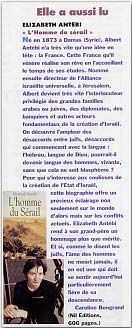 « The historical thrillers are coming back this summer with new vigor. The latest example is L’Homme du Sérail [Jewish Pasha], by Elizabeth Antebi, which portraits, in fiery and ardent fashion, an incredible and fabulous adventure. Taking place when Jerusalem belonged to the Turks, at the twilight of the Ottoman Empire, this fascinating story of the love between a handsome Syrian and a charming French woman introduces us to Baron Edmond de Rothschild, the future Israeli prime minister David Ben Gurion, and the future Turkish president Mustapha Kemal. A success. » Gonzague Saint-Bris, Femme. « The historical thrillers are coming back this summer with new vigor. The latest example is L’Homme du Sérail [Jewish Pasha], by Elizabeth Antebi, which portraits, in fiery and ardent fashion, an incredible and fabulous adventure. Taking place when Jerusalem belonged to the Turks, at the twilight of the Ottoman Empire, this fascinating story of the love between a handsome Syrian and a charming French woman introduces us to Baron Edmond de Rothschild, the future Israeli prime minister David Ben Gurion, and the future Turkish president Mustapha Kemal. A success. » Gonzague Saint-Bris, Femme.
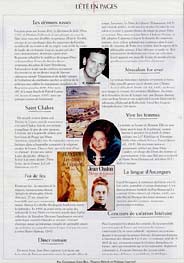 « This book is a crucial contribution to the history of Palestine and of the Palestinian Judaism, for all that period of before the First Wold War. It and introduces us to an historical perspective, neglected by the Zionist historiography, for ideological purposes. » Henry Laurens, Le Monde Diplomatique, November 1996. « This book is a crucial contribution to the history of Palestine and of the Palestinian Judaism, for all that period of before the First Wold War. It and introduces us to an historical perspective, neglected by the Zionist historiography, for ideological purposes. » Henry Laurens, Le Monde Diplomatique, November 1996.
« Albert Antebi gave his name to a street, in Tel Aviv, and to a cul-de-sac, in Jerusalem. Ottoman, Jew, lover of France and cognac, husband of a woman from Lorraine, this colourful character helped a great many people – like future prime minister Ben Gurion, who was his political enemy. […] A wonderful saga, teeming with all kind of adventures and heroes. » Alain de Penanster, Valeurs Actuelles.
« In a more or less fictionalised biography, the author follows the trail of this crossroads man. Perfectly aware of the diversity of Middle Eastern cultures, Albert Antebi became the director of the Institute of Technology of the AIU in Jerusalem, advisor to the commandant in chief of Ottoman Palestine, Jemal Pasha, and consultant or friend to the foreign consuls. At the end of World War I, before he died of typhus aged only forty-five, he saved, in a devastated Istanbul, thousands of Muslim, Jewish, Greek and Armenian refugees, with the help (and the boats) of France. » N. Weil, Le Monde des Livres, May 17,1996.
« 1873-1919. Damascus, Tunis, Constantinople, Jérusalem. While telling us the edifying story of her grandfather, Elizabeth Antébi presents to us a saga of the Jewish population of Palestine before the Balfour Declaration. Through the destiny of Abraham Antébi, director of a school, banker, advisor to influential Ottoman dignitaries, translator and right-hand man of the baron Edmond de Rothschild, one can discover for the first time unrecognized or unappreciated events which took place during the genesis of the re-creation of the State of Israel. An entire microcosm with diverging interests is described from Jerusalem to Tel Aviv, from Rosh-Pinah to Zikhron-Yaakov. Zionists and anti-Zionists, Orthodox Jews, pro-Germans or pro-Russians, Anglophiles or friends of France, Arabs and Ottomans, Moslems and Christians..[…] The book is full of edifying anecdotes on essential persons of that key-period.[…] Thanks to the remarkable amount of work, and Elizabeth Antébi’s scanning and reading of thousands and thousands of letters, the Great Antébi comes out of the dark. » Jean-Pierre Allali, Tribune Juive.
« During his years in Jerusalem, Antébi knew everybody there was to know, from the Sephardic community to the Ashkenazi newcomers, from the great rabbinate to the Turkish governors, from the Zionist leaders to Rothschild representatives. Within the pages of this book, one will meet everybody of influence in Palestine at that time – with a repertory or short biography of them at the end : the Antébi family, the Arabs, the Germans, the leaders of the Alliance, the Americans, the English, the diplomats, the big names of Egypt and Jerusalem, the Jewish Colonization Association, the Ottomans, the Zionists … World political events are seen in the very special light of the view from Jerusalem, from the offices and Paris headquarters. The local gossips are not forgotten. Albert Antebi’s life is a true thriller – with successes and triumphs, but also failures and disillusionment. He married a young Alliance teacher frim Lorraine, who was never fond of Jerusalem and they had eight children. Despite his devotion to the ‘religion’ of France, the Orient dominated nature of this Alliance man who was opposed to the German Jews. His disgrace was sudden and tragic. The governor exiled him in Damascus in October 1916. He then lived for the next two years in the Turkish army at the Caucasus front with General Mustapha Kemal. While there, he helped as much as he could the Armenians victims of the Turks. With the defeat of the Ottoman Empire, he went to Constantinople, where he became dragoman of the French embassy and saved deportees and refugees while waiting to sail for France. A sudden and terrible illness killed him in Marc 1919. He was not yet forty-six. He was buried at Galata cemetery. With great talent and an inspired pen, his granddaughter gives us a vast fresco full of dreams, inviting us on a long and fascinating journey.” Simon Schwarzfuchs, L’Arche.
« A former writer, journalist and publisher, Elizabeth Antébi became a historian to follow the young Albert-Abraham from Damascus to Israel. This four-years work was so important that she has now also prepared a Ph.D thesis on baron Edmond de Rothschild, including new and previously unpublished material, throwing new light on the genesis of the future state of Israel, and especially providing new information on the twenty-five years of colonization by the Rothschilds before the first Zionist went to Palestine. Abraham Antébi was one of the Damascan Jews for whom the Alliance israélite universelle represented the chance for a new life. Descendent of the main protagonist of the Damascus Affair of 1840 (with Moise Montefiore and Adolphe Crémieux coming to Syria and Palestine to save the Jews unjustly accused of ‘ritual murder’), he was born into a very famous family of rabbis. Dreaming of an escape from his fate, he was fascinated by the West, and, with the help of the Alliance, came to Paris, at the age of fifteen. There, he met his future wife, Henriette. Antébi became one of the most important directors of the Alliance, and was send to Jerusalem, where Jews, Arabs, Turks and Westerners were prey to violent conflicts. Even in the Jewish community, Antébi was confronted with all kinds of enemies and rivals – Ashkenazis, Sepharades, Zionists, Orthodox, German (and German Jews from the USA), English … Not always agreeing with the Alliance, he was faithful to his ideals until death; he deeply respected his Arabs neighbours, with many of whom he was a friend. With this historical background, retracing most of our conflicts, which would determine the policy of our European (and American) countries for the XXth Century – the Russian Revolution, Jews used by Germans before being killed by them, Bosnia, the Balkans -, Elizabeth Antébi carries us along in a hustle and bustle of amazing facts and persons, actors or victims of jealousy, passions, and international tensions created by the Great Powers. Staying the course, hated as much as revered, Albert Antébi was the stone around which everyone gravitated. The author also, to our pleasure, takes, from time to time, the role of the historian to paint some wonderful psychological portraits. The hopes and loves of Albert, the sufferings of Henriette become more human as a result. A historical thriller, retracing the genesis or our time.” Jean-Claude Kuperminc, Les Cahiers de l’AIU, n° 6.
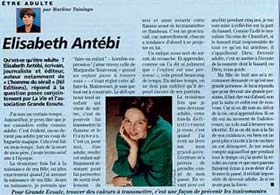 « What means being an adult ? Elizabeth Antébi, writer, journalist and publisher, author of L’Homme du Sérail (NiL Editions) answers to the questions asked together by the catholic magazine La Vie et the anti-drugs association Grande Ecoute. “For me it was a three-stage experience, the first being when my father died – I was 39. The second was when my daughter was born. The challenge taken at that time was to be able to transmit the flame and the torch. The third and last phase of my metamorphosis was when I finished writing my book on my amazing grandfather. Having lived with this historical heroe-ancestor for more than five years, I discovered that chance doesn’t exist. As the French moralist Nicolas de Chmfort used to say, if chance was responsible for all that men attribute to it, it could be called God.[…] To become a real grown-up, one has first to say ‘yes’, then ‘no’, and ‘yes’ at the end. Because if your begin your life by saying ‘no’, you learn nothing. If you say ‘yes’ too much when you are an adolescent, you cannont find your own identity. And if you say ‘no’ at the end, you can no longer progress or believe in anything. » in « Being an adult » by Marlène Tuininga, La Vie, September 5, 1996. « What means being an adult ? Elizabeth Antébi, writer, journalist and publisher, author of L’Homme du Sérail (NiL Editions) answers to the questions asked together by the catholic magazine La Vie et the anti-drugs association Grande Ecoute. “For me it was a three-stage experience, the first being when my father died – I was 39. The second was when my daughter was born. The challenge taken at that time was to be able to transmit the flame and the torch. The third and last phase of my metamorphosis was when I finished writing my book on my amazing grandfather. Having lived with this historical heroe-ancestor for more than five years, I discovered that chance doesn’t exist. As the French moralist Nicolas de Chmfort used to say, if chance was responsible for all that men attribute to it, it could be called God.[…] To become a real grown-up, one has first to say ‘yes’, then ‘no’, and ‘yes’ at the end. Because if your begin your life by saying ‘no’, you learn nothing. If you say ‘yes’ too much when you are an adolescent, you cannont find your own identity. And if you say ‘no’ at the end, you can no longer progress or believe in anything. » in « Being an adult » by Marlène Tuininga, La Vie, September 5, 1996.
At the Brussel’s Book Fair, with my bookseller, Mark Philipson : 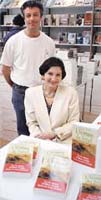
Their reactions and statements :
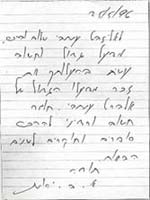 "For Elizabeth Antébi, shalom and peace" "For Elizabeth Antébi, shalom and peace"
"You did a great and important work, reminding what Albert Antébi did in his life. It will be an indispensable and very serious material for many authors and researchers for years to come. Thanks." A.B.Yehoshua, Israelian writer.
« But really, your dear Albert Antébi is … yourself! At the end, I find more of Elizabeth in Albert than of Albert in Elizabeth. Same determination, same obstinacy, same generosity, in a word, your ancestor is all in you for the genetic crossbreeding, but you are part of him, if we consider the psychological portrait you did.» Me Jacques Boedels, author of Habits du Pouvoir, la Justice.
« Your wonderful ‘novel’ is more than paying your grandfather familial respects : its introduces us to the sources where the Alliance has to deal with the emerging of the State of Israël at birth. I wish to your Homme du Sérail the big success and audience that he deserves. » André Chouraqui.
EXTRACTS
XXXI. Putsch
Albert couldn't leave right away because the fall of Adrianople, the former capital of Emperor Hadrian which had known Ottoman glory, had driven the Young Turks stark raving mad. At the end of January, 1913, the government met in a room of the Imperial Palace in Constantinople when, suddenly, those present heard the stamping approach of boots, a man broke in, drew out a pistol, and struck down the Minister of Defense with two bullets. "That was Enver," said Rechid Bey, the former Governor of Jerusalem who had been with the panic-struck Ministers and was now telling Antebi about it: "He yelled, 'We're going to retake Adrianople,' then he had several of us held in custody, turned his heels, and left."
But by means of such extremism, Union and Progress was returned to power and proved its determination. As a result, Rechid Bey had to yield his position as Minister of the Interior to his predecessor Talaat, the friend of Grand Rabbi Nahum. Albert had met this man once and remembered him as a manipulator, without Enver's panache but with the perseverance and doggedness of a foot soldier, both merciless and pragmatic ... a man of the "everyday revolution".
Albert acted as a counterweight against Austrian, German, and Russian Jews by working to gain French protection for Moroccan Jewry - the Treaty of Fez had already established Morocco as a French protectorate. "In this way, France will have three thousand Jewish protégés just in our Judea," he explained, continuing: "The moment would be right for productive Jewish activity if there was less talk, but the Ussishkins and the Warburgs have a need to express themselves. They do nothing, they wave their hands in the air, and attack us, but they don't refuse our help and even they ask for it, whenever there's a hard and complicated task to accomplish. Their agents in Jaffa, just as we do, deplore such harmful commotion, but no-one heeds their advice. Dr. Ruppin, head of the Palästina Amt, is liberal with loyal and clear-sighted advice that everyone looks up to. And he spreads our views to several of his colleagues in Jaffa, but Berlin and Odessa apparently want only drum majors."
At the end of January, a Russian Jewish commercial advisor whose aid had been solicited by Levontin and the Anglo-Palestine Bank, put at Albert's disposal the sum of 100 000 francs to buy the houses next to the Wailing Wall (kotel maaravi, "The Western Wall"of Solomon's Temple) in order to demolish these and convert the space into a garden with a small room to shelter pious Jews. Albert, consulted, thought he was dreaming. He demanded freedom to negotiate, too many people had had their hands in the pie, too many committees (waadim) were involved! This had been the reason that the negotiations formerly conducted on behalf of the Baron de Rothschild had failed: "The task is possible but arduous. Of course, I had laid the groundwork for success before, but certain Ashkenazis, anxious to make a profit or just jealous not to be involved, complicated the procedures. Nevertheless, with a little bit of tactful know-how, the operation could be taken up again effectively."
It was all the more important to act discreetly now that the Arabs in Beirut were examining a project for reform and administrative decentralization: "The Arab Congress is organizing, its agenda for the day is 'Closing of Palestine and Syria to the Jews.' Our Zionist Jews, everywhere, are talking about sending a delegate there to speak up for Jewish rights... But nothing should be done precipitously, especially since we have no solid ground under our feet... I say to you frankly and sincerely: let's act in the open, don't dig any pits for me, no ditches, in this time of war and combat."
In fact, neither the Ministers of the Ottoman capital nor those of the Quai d'Orsay looked favorably upon Jews from Salonika, where they were a majority, who demanded the status of an open city for their "homeland." The ambassador of France to Greece wrote that this would constitute a veritable Jewish state writ small, "an Austrian dependency under the mask of Jewish masqueraders."
For still others, like the French ambassador to Bulgaria, the Dreyfus Case "had permitted Austrian Jews to search out a method of assimilation rendered respectable by the Alliance Israelite, faithful as it was to the French Revolution, through a Zionist nationalism organized according to the models used in Central and Eastern Europe, one that was uncompromising, militant, and inspired by Anglo-German ideas" in which "the Jew has become a national figure next to the Czech and the Romanian." The same diplomat ended his letter with words that Albert could only assent to: "Zionism is paving the way for the descent of the Germanic hordes and the Alliance is thus strengthening our Mediterranean defenses."
At the end of March, 1913, on Purim, Albert was finally able to go to Egypt and be with parents who were collapsing under the weight of one loss after the other: it had not been long before two of the daughters of the unfortunate Leah had followed their mother into death.
Albert was devastated to see his father, become a truly old man, and his mother, the indomitable Esther, so enfeebled. Back in Jerusalem, he spoke about it to Henrietta, once again pregnant.
"I'll have to watch over them from close by and get them out of Egypt."
"Do you mean...?"
"Yes, of course, I mean to put them up here, that's the only solution. After all, you had your mother with us for a very long time, didn't you?"
He rolled his shoulders in their sockets as he did each time he felt ill at ease. Henrietta's glance made him ask himself whether there could be kinship between this reserved and self-effacing woman who was always willing to lend a hand and had taken on the permanent job of child care and a sectarian shrew and an old man, both hailing from Biblical times and rousing holy terror in their daughter-in-law.
Before his Zionist friends, Albert outlined his future projects: "The reopening of the Oriental Question, which could cause Europe much torment, should stimulate the Jews to unite their forces and develop a purely Jewish polity, one rational and realistic, destined to allow us to keep positions already held and open the vast, as yet unpopulated territories of our Turkey to Jewish enterprise and immigration. If Turkey is to become regenerated in Asia, our Jews, whether Turkish or not, can contribute to its prosperity. Our agricultural and vocational schools will be the nurseries for workers participating in this economic rebirth so necessary for our country, with or without the Turkish government."
Dizengoff and Ruppin exchanged astonished glances: this was the first time that Antebi had spoken of an Ottoman Empire directed toward Asia without the turbulent provinces of Thrace and Macedonia. Wasn't this the position held by a very small minority of officers like the disagreeable Mustafa Kemal, seemingly in the process of distinguishing himself for valor on the Bulgarian front.
Jacques Bigart was, like Antebi, for the preservation of the Ottoman Empire, but for an Empire more European than Asiatic. He would like everything to be handled with the wordly manners of a salon of the Rue St. Georges. Such was the gap between the two men that it became constantly wider. Moreover, in the view of Paris, Antebi was acting as a Zionist, buying up land, using his influence indefatigably by stepping in to broker deals with the Turkish government, even when these were in regard to the Grand Rabbinate. Bigart didn't want to know about the issues that separated Albert from Zionism - the atheism, the ideology, the irreverence - and what these differences implied.
"You don't know what a ghetto is, Monsieur Antebi!" young Ben Gurion had flung out at him once. "Without slogans and anti-religious propaganda, how could these young Russian Jews liberate themselves from the law of the shtetl (the small town Jewish community), from their parents, resigned to everything in order not to delay the Messiah's coming?"
"And would you like to make a huge ghetto of the world?" Albert had replied. "As for myself, I know only too well what a Jewish Quarter is where the doors are open but misery and fear reign. I came out of such a one, and each day I bless the millionaires who helped me leave, the Hirschs and the Rothschilds, without whom we would be nothing. One day, nothing will be left but the memory of fear and this will consume you; so watch out."
In a letter to Nahum, with who he was to maintain a regular correspondence, Albert laid out a part of his cards: "Jewish interests have never been more strongly with a France powerless to impose itself on Syria and Palestine. The fact is that we alone can secure peaceful penetration of the area, intellectually, morally, and economically, for the forces of international priesthood have pushed local Catholics toward Italy, while the Greek monastery has been directing its Orthodox flock to Russia, and the Protestant missions have been turned in the direction of England and Germany. French tradesmen and Roman Catholic institutions are rare and, with some exceptions, French clergymen are in the minority. In any case, economic influence, that weapon of tomorrow, could never be wielded by monks."
As to restrictive measures against transfers of property by foreigners, holding on to these never posed a problem for the enterprising: "We continue to make transfers of small and large surfaces to the names of Messieurs Franck, Ruppin, Thon, Levontin, and Straus. I have never run up against an absolute strait jacket."
For this reason, it was not really necessary to insist on symbolic measures as Nahum wanted - the abolition of the red card, for example - because this would risk a backlash of local anger just when the Young Turks themselves scarcely knew how long they would last. Albert was sensitive to the insecurity and asked Nahum: "Aren't you afraid of their holocaust of us, held in ransom as they are by Arab demands whose first article of policy in their 'War against Jewry' is such extermination, a policy approved by the Syrian Congress and submitted to the authorities."
Albert was for clear-cut opinions and decisions; he proceeded with animal instincts and Turkish brutality. Nahum, too, was Oriental, but like Monsieur Nissim of bygone days was rondabout and, like water, had the skill of fitting his channel and slipping over the rocks in the way. However, Albert was no unforeseeing stream; the main thing for him was to prepare for the future: "Palestine is the last province that would be taken away from Turkey. At all events, it could be declared international, at least Judea could. Of course, using the criterion of trade and geographical position, a partition could eventually be made making it part of France and England both, but in terms of the direct influence on it and local activity within it, using the criterion of the number or foreign nationals and their movement, both Germany and Russia hold first place. Now the accession to power of either of these two powers could deal a mortal blow to the Jewish preponderance very real now and capable of growth."
Consequently, he proposed to obtain permission for administrative decentralization and provincial autonomy and worked to consolidate English and French sympathies with a view of "forming a solid core of people with Ottoman, English and French interests that no conquest could destroy."
Then, on the 11th of April, 1913, when the French Consul finally signed a treaty with Spain permitting "Moroccans currently nationals of Spain but not originally from this power's zone within Morocco" to be protected by the French Consulate, Antebi took to dreaming of a world completely different "if only Jewish nationalism would not have his centers in Cologne, Berlin, Venice and Odessa."
He continued: "Especially in the Near and Middle East, European diplomacy has been astride volcanos whose craters are watched over by minorities. If one doesn't keep his eyes open, he can be erupted without warning."
The Arabs were trembling with anger more than ever. Ruhi El-Khalidi, the ex-Consul at Bordeaux, had just published a book, Palestine Invaded by the Jews, in order to "discharge his debt to history"... such were his words. And the Syrian Rachid Rida, former pupil of the Grand Mufti, editor of El-Manar, and Amin El Husseini's professor in Cairo, had been a member of the party for Ottoman Decentralization from the start. The headquarters of the Organization of Young Arabs (Al-Fatat), created two years earlier in Paris on the model of the Young Turks, had just moved to Beirut. Everything was thus concentrated in the northern region of Greater Palestine.
The Zionists didn't take this into account and kept on with their incitement. The new Zionist high school, which dispensed an "education of atheism, libertinage, and license" in Albert's words, wanted France to recognize its diploma and grant it equivalency. Albert was indignant: "Marching to the same martial music, the Union of Teachers, the Union of Workers, and Maccabi joined in the cry, 'Up and at the non-Zionists!'. In this way, they were adopting Joshua's formula for their letterheads - 'He who is not with us is against us.' However, since they couldn't very well start off with such an uninclusive battlecry, they began to say, 'Up and at the non-Jews...!' In vain do we point out the disastrous consequences of anti-Christian and anti-Moslem action during a period of political unrest, growing anti-Semitism, European intervention, and indigenous revolt. These Russian anarchists don't want to understand, their bulls are printed, translated. In the meantime, we are nevertheless answerable to startled Ottoman authorities and irate Consulates..."
"Monsieur Gueyraud told me the following: At no more than the hint of an attack, you people shout persecution and clamor for protection from the big powers. But here you think you're numerous enough to gang up on our school. With this behavior, you're bound to alienate everyone and force the Consuls to protect their institutions from you... But where's the public for such a speech? Disorder is everywhere."
"Nationalist Zionists and Hilfsvereinists," explained Albert to the Consul, "have done their best to render the ICA, the Alliance and even the moderate wing of the Lovers of Zion null and void. But the weapons they have forged and whetted for use have been turned against them as soon as the extreme left got hold of them. The Maccabi clubs, the workers unions, the socialist and anarchist cooperatives, and the atheist gymanasia hatched by Ussishkin and led by the shameless, ambitious types are shoving the moderate Zionists aside; now they are talking about burning the timid Kahn of The Hague at the stake because the latter, creature of the Zionist Jewish Colonial Trust, seemed guilty of having blown the whistle on the squandering of a million on a communist settlement in Tiberias!"
German Jews tightened their grip. In a letter to the Alliance, Albert cited from a letter from Dr. Warburg to Arthur Ruppin emanating from Berlin which the French Consul had given him to read: "The German government is exercising heavy pressure on the Hilfsverein and on Zionist groups with a view of coordinating their activity with that of German politics in all of its Palestinian manifestations... The German government wants to create a school of medicine in Jerusalem to rival the French school of Beirut, making German interests greater than those of the French. You know that the Zionists, too, have projected the creation of a university in Palestine. We are studying a way to fuse the two plans which will only make us stronger, morally and politically..."
The French Consul, meanwhile, was unsuccessful in convincing his hierarchy to counter German influence... after all, this was a time when Jules Cambon, ambassador to Berlin and brother of the former ambassador to Constantinople, was advocating rapprochement.
At the beginning of June, the press reported a sensational development: Albert was accused of consorting with Christians and, on top of his friendship with Father Lagrange, sent his daughters to the School of the Sisters of St. Joseph! Accordingly, Vice-president Arnold Netter demanded an explanation. Albert began by raising a smoke-screen and assuring him that his children attended neither a parochial nor a mission school; they went to the Imperial Ottoman Academy like many sons of prominent Jews, Ephraim Cohn and Ben Yehuda, for example: "It has been now ten years that my children, a fact known and witnessed by all, in Paris and Berlin as well as Jerusalem, have been attending this German-style Gymasium... Which century are we in? The Spanish Inquisition is no longer in force. So away with the Inquisitors! Scandal slanderers and despicable liars be damned! Germanic gentlemen, you won't get me! Find someone else to carry Kaiser Wilhelm's messages!"
Albert did some tightrope walking to hide his difficult position, but the Alliance was blunt; it wanted a simple yes-no answer about his daughters' relation to the courses given by the good Sisters. Then, one month later, it discovered that the Antebi girls, 12 year old Renée and 7 year old Margot, did take piano and embroidery at St. Joseph. They were playing the parts of young middle-class girls from Chalons at the Sisters!
Albert was stunned. What degree of fanaticism had one reached when a snip of a girl wouldn't make a doily or pound the keys in peace? But he regained enough composure to lay out, authoritatively, the delicate problem of education for a journalist from Haherut come to interview him - difficult because, in this age of the division between Church and State, this was a big problem dividing all of France: "We Jews would be erased from the face of the earth if the education and teaching of the child were ruled by the laws passed by any majority whatsoever, by the religious majorities swallowing us or by socialist and agnostic majorities ready to hold our heads under water... What's more, any principle or idea of truth or right that aims to impose itself on us by autocratic force can have no chance of a viable existence in our community."
"We have lived dispersed throughout the world for 2 000 years, witnessing the agony and death of other peoples more powerful and better organized. But despite moral degeneration and vicissitudes, despite slaughter and persecution, we have stayed alive. What ideal, what principle has been our life-giving elixir? Our conservatives attribute our endurance to the Mosaic Law, our rabbis to the observance of the rite, our Hebraists to the Hebrew language, and our nationalists to the hope kept alive of a return to our ancient nationality. So we contain all shades of opinion and, in order to make a synthesis of the color white of the rainbow, symbol of a pact, an alliance, and a regenerative union compacted with God after the Flood, all of these shades are necessary to compound Jewish awareness, the sole component of our vitality. However, to want to feature just language or religion, for example, to the exclusion of the other factors, would be to dessicate the main factor and thereby abolish all hope of vitality..."
"Hillel has defined Jewish awareness as the love of one's neighbor. It would therefore be inadmissible to allow war, battle, excommunication, intolerance, or ostracism for the purpose of making any idea whatsoever prevail... We Jews must especially engrave tolerance in bold letters on the universal code in order to ensure respect for our ways in the universe."
"We cannot, therefore, send our children to the school of exclusivist chauvinism. We know that this attitude may be mitigated by teaching socialist internationalism, but the insufficiently developed mind of our children could never resolve such irreducible contradictions."
His conclusion was prophetic to the coming century: "Our malady is called neurasthenia and our organism is suffering from an unstable axis, from a deviated backbone. In Europe as in Palestine, personal issues take precedence over general questions. Everyone wants to get ahead, even by putsch. As a result, there's envy, bewilderment, and disorder. What divides is exploited rather than looking for what unites."
|



